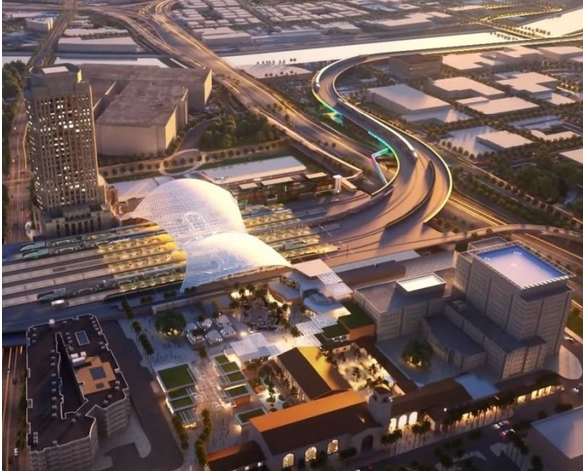This Thursday, the Metro board is expected to greenlight an initial preconstruction phase for the Union Station's run-through tracks. The long-anticipated, much-needed project, called "Link US," will upgrade Union Station to create efficiencies for Metrolink and Amtrak, and to prepare for future high-speed rail.
Since its opening in 1939, Union Station has operated with inefficient stub-end tracks, where trains nose in to the station and then have to reverse to get out. Metro estimates that fixing this issue via Link US will increase Union Station capacity (from 180 to 278 trains daily) and reduce train dwell times (from twenty to five minutes).
The Link US improvements are a costly mega-project: they include new bridge structures over and along the 101 Freeway and new rail tracks in and along a historic structure (which is atop sensitive archeological resources), all of it needing to be built while keeping current trains operating.
The Metro board approved Link US environmental studies (under CEQA - California Environmental Quality Act) in 2019, opting for a somewhat trimmed project scope that took an early estimated $3 billion cost down to the current $2.3 billion estimate.
The Link US project is being broken up into several phases. The initial, funded Phase A includes construction of the bridge over the 101 Freeway and two initial run-through tracks. A future, not-yet-funded Phase B includes raising the main platform area, building new interior concourse areas, and adding additional run-through tracks.
As the run-through tracks will benefit planned high-speed rail, the CA High-Speed Rail Authority (CAHSRA) is a funding partner on the project, contributing $423 million. According to Metro's staff report, additional project funds have come from the state's Transit Intercity Rail Capital Program (TIRCP - $227 million), the State Transportation Improvement Program (STIP - $61 million), local Measure R Commuter Rail Funds ($51 million), a CAHSRA planning grant ($19 million), and a couple of other smaller sources.
This week's board item would approve the terms of the $423 million CAHSRA funding, as well as approve a $298 million "Partial Preconstruction Phase" project budget.
The partial preconstruction phase would finalize design and engineering under a Construction Management/General Contractor (CMGC) delivery process, as well as complete real estate acquisitions across from Union Station (south of the 101 Freeway).
Metro's timeline shows completion of federal environmental studies (under NEPA - National Environmental Policy Act) this summer, with Phase A construction anticipated to get underway in late 2023.
The critically important Link US upgrades represent just one way that the CAHSRA is supporting rail infrastructure improvements in L.A. County to prepare for the ultimate arrival of the state's high-speed rail system, which has more than a hundred miles under construction in the Central Valley. Some anti-high-speed rail State Assembly Democrats, including Anthony Rendon and Laura Friedman, point to a supposed lack of CAHSRA investment in southern California rail as a pretext to deny and delay high-speed rail funding. But CAHSRA is already supporting numerous rail projects in L.A. County - including grade separation construction underway at Rosecrans-Marquardt in Santa Fe Springs, Link US construction planned at Union Station, support for other Metro rail projects (including contributing funds to the Regional Connector subway), and support for planning additional projects like the Doran Street and Broadway/Brazil Grade Separation Project.
The Metro board will meet this Thursday at 10 a.m. to vote on Link US, as well as the FY23 budget, the cancellation of the 710 Freeway widening, and more. Find the full agenda and staff reports at the Metro board webpage.






